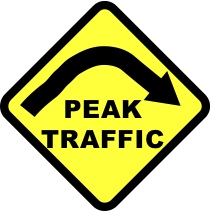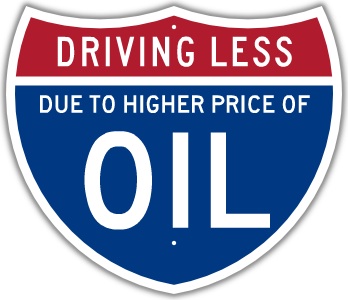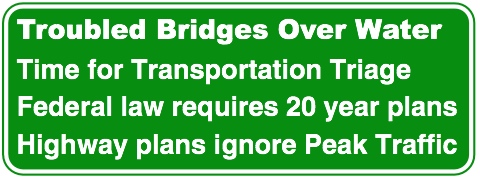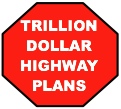Links
www.biologicaldiversity.org/publications/papers/SPP_report_small.pdf
Highways to Hell:
A critical examination of the environmental
impacts of the Security and Prosperity Partnership
a review of some of the environmental impacts of various NAFTA Superhighway proposals (probably the most comprehensive that is publicly available from any environmental group). It focuses on cumulative impacts, Clean Air Act, endangered species and critical habitat, wetlands, Section 4(f) and other environmental laws. However, there is no discussion of how Peak Traffic and Peak Energy impact traffic planning for alleged future demand.
www.taxpayer.net/TCS/RoadRuin/statements.htm
Road to Ruin report (1999 publication highlighting key road fights - published
by Taxpayers for Common Sense and Friends of the Earth) (no longer on line?)
www.taxpayer.net/projects.php?action=view&category=&type=Project&proj_id=2637
http://cche.vcn.bc.ca/resources/handbook
For Immediate Release
2 February 2006
Citizen Action Will Stop Gateway
Citizens Concerned with Highway Expansion release Freeway Fighter's Handbook with rush hour protest
Vancouver - Today Citizens Concerned with Highway Expansion released a Freeway Fighter's Handbook with a morning rush hour protest at the 1st Avenue interchange on Highway 1.
http://content.sierraclub.org/beyondoil/content/smart-choices-less-traffic
Each year, America invests more than $200 billion in federal, state, and local tax dollars on transportation infrastructure—bridges and highways, aviation and waterways, public transit and sidewalks.1 But too often transportation projects undermine the higher national goals of reducing oil consumption, increasing safety, improving public health, and saving local, state or federal government—and citizens— money.
Americans are struggling with the health, climate, and economic costs of our oilcentered transportation system. While new standards that double fuel efficiency of new vehicles to 54.5 mpg by 2025 and cut carbon emissions in half are essential to reducing our dependence on oil and its many consequences, our transportation investments should provide an opportunity to further reduce our dependence on oil, reverse climate disruption, and save money. Because transportation infrastructure lasts for decades, the impacts of transportation investments are felt for many years to come, with huge consequences for America's ability to move beyond oil.
Read the full report
www.sierraclub.org/transportation/downloads/2012-11-Best-Worst-Transportation-Projects.pdf
note: This Sierra Club report is generally good but fails to notice the full scale of planned highways around the country. There is also no mention that politicians from both parties support highway expansion. It would be helpful if the Sierra Club stopped endorsing politicians who want more limited access highway construction and widening if they are Democrats and pay lip service to environmental concerns.
It would also be helpful if the national office posted anything about how to actually fight freeways, mentioned Peak Traffic and Peak Oil, or mentioned the "High Priority Corridor" plan that Congress has promoted in the 1991, 1995, 1998, 2005 and 2012 transportation laws. The only national environmental group I know of that recommended these laws not be passed was Friends of the Earth, although they did not include Peak as a reason not to expand highways.
www.mcclatchydc.com/2013/02/03/181506/us-keeps-building-new-highways.html
Posted on Sunday, February 3, 2013
U.S. keeps building new highways while letting old ones crumble
MORE ON THIS STORY
Story | Special-interest push for South Carolina interstate hits roadblock
Story | Politics and road building intersect in Kentucky
Graphic | Your highway dollars at work?
On the Web | Engineers: South Florida bridges rated 'deficient' remain safe to use
On the Web | Tri-City road projects likely going nowhere, as state and federal money runs dry
On the Web | More McClatchy stories from around the nation
By Curtis Tate and Greg Gordon | McClatchy Newspapers
WASHINGTON — Oil-rich Texas has built more highways and bridges than any other state, but over the next two decades it will fall $170 billion short of what it needs to keep the sprawling network in good repair.
In California, transportation officials estimate that 60 percent of the state's roads and a quarter of its bridges need to be repaired or replaced, at a projected cost of $70 billion over a decade, some $52 billion more than the available funds.
North Carolina anticipates that it will fall short of keeping its highways in current condition by $22 billion over the next 30 years, and would need more than twice that amount to improve them.
America's highway system, once a symbol of freedom and mobility envied the world over, is crumbling physically and financially, the potentially disastrous consequence of a politically driven road-building binge.
President Barack Obama, state transportation officials, civil engineers, road builders and business groups all say that the country needs to invest trillions of dollars in its infrastructure, yet there's little consensus on how to finance it or what the most pressing needs are.
The Congressional Budget Office estimates that the country needs $14 billion in additional federal funds each year just to maintain highways and $50 billion more to improve them.
There's no single cause of the financial squeeze, and federal data reveal only part of it. Some states have raised their own gasoline taxes to pay for highway construction and maintenance and to depend less on federal funding. Others haven't changed their gas taxes in years and rely on federal money to make up for it.
But federal government analysts, taxpayer advocates and transportation experts have warned for at least a decade that many states were spending too much on building highways and too little on fixing them, and that their maintenance costs would skyrocket if they didn't change course. "We've engaged in a dangerous game of deferred maintenance," said Brian Taylor, a professor of urban planning and the director of the Institute of Transportation Studies at the University of California, Los Angeles.
Five years after an interstate highway bridge collapsed in Minnesota, killing 13 people and injuring 145, the country still has a bridge repair backlog of $65 billion, according to the Federal Highway Administration.
At a time when Congress is proposing significant budget cuts and tax increases have little support, states are canceling or scaling back highway projects. They're looking for private partners to help finance construction, and still coming up short. Motorists are discovering that the roads they thought were free are anything but.
Stop the Road- Freeway Revolts in American Cities -- Mohl 30 (5)- 674
-- Journal of Urban History
http://juh.sagepub.com/cgi/content/short/30/5/674.html
http://ourtomorrow.blogspot.com/2005/03/stopping-nafta-superhighway.html
http://en.wikipedia.org/wiki/Freeway_revolts
Freeway and expressway revolts
www.worldcarfree.net - World CarFree Network (links to international efforts to promote transit, bicycles and stop highway expansion)
Federal Highway Administration Environmental Guidebook
www.aaroads.com/high-priority/table.html
a pro highway website that does a better job listing Congressionally mandated new and upgraded roads, no "environmental group" dares mention this (in the 1991, 1995, 1998 and 2005 surface transportation laws). This list is not ALL of the highways under development, merely those specified in the appropriating laws to be Congressional priorities. I've been unable to find a complete list of all planned road expasions, I doubt even most FHWA officials have that (the information is too fragmented and convoluted for a simple summary). Most big projects are FHWA approved since most of the funding is federal, although there have been some large roads (and countless small ones) that bypass federal funding and therefore federal environmental requirements.
It is interesting that the national environmental groups such as Sierra Club and Natural Resources Defense Council (NRDC) do not keep track of these efforts, nor do they maintain guidebooks to help citizen groups fight freeways (beyond the obvious suggestions of promoting public transit instead of more roads).








